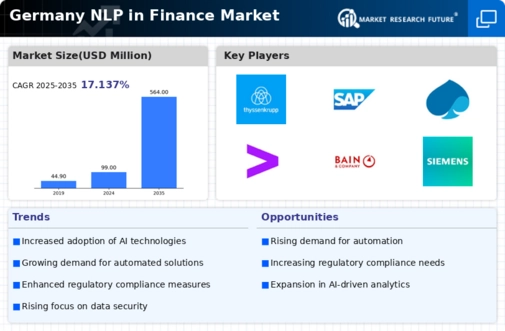Emergence of Real-Time Analytics
The emergence of real-time analytics is significantly impacting the nlp in-finance market in Germany. Financial institutions are increasingly adopting NLP technologies to process and analyze data in real-time, enabling them to respond swiftly to market changes. This capability is particularly valuable in trading and investment decision-making, where timely information can lead to competitive advantages. The market for real-time analytics is projected to grow at a CAGR of 18% from 2025 to 2030.. By harnessing NLP for real-time insights, organizations can enhance their operational agility and improve overall performance. This trend underscores the growing reliance on advanced analytics within the nlp in-finance market.
Growing Importance of Data Privacy
The growing importance of data privacy regulations is reshaping the NLP in Finance market in Germany.. With stringent regulations such as the General Data Protection Regulation (GDPR) in place, financial institutions are compelled to adopt NLP solutions that ensure compliance while maintaining customer trust. Organizations are investing in technologies that facilitate secure data handling and processing. This focus on data privacy not only mitigates legal risks but also enhances brand reputation. As a result, the demand for NLP tools that prioritize data security is likely to increase. Analysts predict that the market for privacy-focused NLP solutions could expand by 30% in the coming years, reflecting the critical role of data protection in the nlp in-finance market.
Integration of AI in Risk Management
The integration of artificial intelligence (AI) into risk management processes is significantly influencing the NLP in Finance market in Germany. Financial institutions are adopting NLP tools to enhance their risk assessment capabilities.. Financial institutions are adopting NLP tools to enhance their risk assessment capabilities. By analyzing textual data from various sources, including news articles and social media, organizations can identify potential risks more effectively. This proactive approach to risk management is expected to reduce financial losses and improve compliance with regulatory standards. Reports indicate that the use of AI in risk management could lead to a reduction in operational costs by up to 20%. Consequently, the growing emphasis on risk mitigation is likely to propel the demand for NLP solutions within the nlp in-finance market.
Rising Demand for Automated Insights
The nlp in-finance market in Germany is experiencing a notable surge in demand for automated insights. Financial institutions are increasingly leveraging natural language processing to analyze vast amounts of unstructured data, such as customer feedback and market reports. This trend is driven by the need for timely and accurate decision-making. According to recent studies, the market for automated insights is projected to grow at a CAGR of 15% over the next five years. As organizations seek to enhance their operational efficiency, the integration of NLP technologies becomes essential. The ability to extract actionable insights from data not only improves customer satisfaction but also optimizes resource allocation, thereby driving growth in the nlp in-finance market.
Shift Towards Enhanced Customer Engagement
In Germany, there is a marked shift towards enhanced customer engagement within the nlp in-finance market. Financial institutions are increasingly utilizing NLP technologies to personalize interactions with clients. By analyzing customer data and preferences, organizations can tailor their services to meet individual needs. This approach not only fosters customer loyalty but also drives revenue growth. Recent surveys indicate that companies employing NLP for customer engagement have seen an increase in customer retention rates by approximately 25%. As the competition intensifies, the focus on personalized customer experiences is expected to further stimulate the growth of the nlp in-finance market.
















